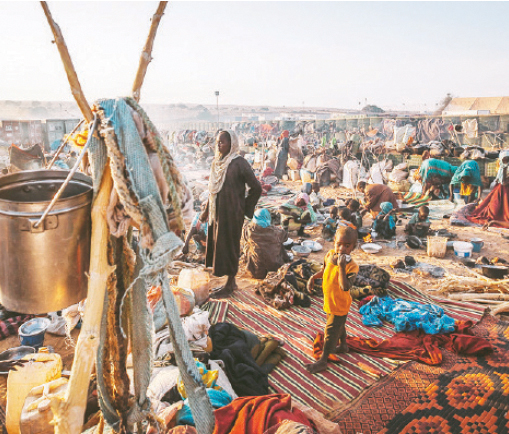The 2016 edition of World Refugee Day (WRD) was commemorated on Monday, June 20. In marking the event, international organisations expressed their desire to alleviate the plight of refugees. Senior Correspondent ONYEWUCHI OJINNAKA captures their concern.
“Our responses to refugees must be grounded in our shared values of responsibility sharing, non-discrimination, and human rights and in international refugee law, including the principle of non-refoulement.”
This was the message of United Nations Secretary-General, Ban Ki-moon, at the commemoration of 2016 World Refugee Day on June 20.
The World Refugee Day is held every year on June 20 to commemorate the strength, courage and perseverance of millions of refugees. This year marks a key moment for the public to show support for families forced to flee.
The event has been marked ever since the UN General Assembly adopted Resolution 55/76 on December 4, 2000 where it noted that 2001 would mark the 50th anniversary of the 1951 Convention relating to the Status of Refugees, and that the African Union (AU) had agreed to have International Refugee Day coincide with Africa Refugee Day on June 20.
In a world where violence forces thousands of families to flee their homes each day, UN High Commissioner for Refugees (UNHCR), the UN refugee agency, believes that now is the time to show world leaders that the global public stands with refugees.
In his message to mark the World Refugee Day, the United States President, Barack Obama, said: “On this World Refugee Day, we recognise the challenges and hardships that refugees face, honour their courage and resilience in the face of overwhelming obstacles, and celebrate their many valuable contributions to our nation.
“This year’s commemoration comes as the UN High Commissioner for Refugees reports that more people are displaced by rising violence, insecurity and persecution than at any time on record. More than 65 million people around the world have been driven from their homes. More than half are children. The scale of this human suffering is almost unimaginable; the need for the world to respond is beyond question.”
He noted that every day, members of the international community, humanitarian organisations, civil society, and individual citizens work to assist these vulnerable populations. According to him, the U.S. provides more humanitarian assistance to refugees than any other nation and maintains the world’s largest refugee resettlement programme.
“We support programmes that provide food, water, shelter and medical care to refugees, and fight for their rights to safety, dignity and long-term livelihood opportunities. We are urging our non-governmental partners, including the private sector, to do more as well.
“Today, we commemorate the spirit and strength of refugees worldwide and the dedication of those who help them on and after their journeys. Protecting and assisting refugees is a part of our history as a nation, and we will continue to alleviate the suffering of refugees abroad, and to welcome them here at home, because doing so reflects our American values and our noblest traditions as a nation, enriches our society, and strengthens our collective security,” Obama added.
In Nigeria…
In Nigeria, the World Refugee Day was marked particularly in Abuja and Lagos. In Abuja, the National Commission for Refugees, Migrants and Internally Displaced Persons (NCFRMI) reiterated the government’s effort targeted at re-integrating the internally-displaced persons (IDPs). The Acting Federal Commissioner at NCFRMI, Ms. Margaret Essien, disclosed at the event to commemorate the WRD that government would ensure that IDPs engaged in meaningful skill acquisition programmes.
“Promoting peace, stability and human rights around the world is very crucial at this time, so that the displaced population can someday return to their homes in safety and dignity,” she stressed.
Recapping the theme of the event, ‘We Stand Together with Displaced People’, Essien said it was appropriate expressing solidarity and support for the IDPs.
“It is also an opportunity to raise awareness on refugee issues and remind people everywhere in the world of their conditions,” she added.
She charged Nigerians not to forget their responsibilities to help those who have lost their homes, lives and livelihood, pointing out that as peace gradually returns to the North East, hundreds of Nigerians that took refuge in the neighbouring countries would seek to return voluntarily.
“We all have a moral obligation and responsibility to lend a helping hand to people who fled as a result of the conflict. Domestically, we are committed to offering protection to genuine refugees and to ensuring that we strengthen our international commitments and humanitarian traditions,” she stated.
Essien averred that “this 17th WRD aims at raising awareness that Nigerians stand together with displaced people to celebrate together and share their experiences”.
Also speaking at the event, the representative of UNHCR in Nigeria, Mrs. Angele Dikongue Atangana, enjoined Nigerians to imbibe the spirit of helping one another, stressing that being displaced could happen to anybody.
She said: “We have in Nigeria more than 2.1 million displaced persons. These are potential refugees if we fail to provide them with what they need when they are still within the territory of Nigeria.
“Our action towards these displaced persons must be preventive to alleviate the sufferings they are already living through.
“If we do not want to stand up to help those wandering, those destitute around us, we should stand up to help ourselves in preventing the trouble from reaching us.”
According to her, more than 60 million people around the world, about one in every 122 people on earth, qualify as displaced person, revealing that UNHCR, in its continuous humanitarian assistance, had initiated an advocacy for a sound legal framework to attend to the needs of IDPs and build the capacity of stakeholders.
In Lagos, the United Nations High Commissioner for Refugees, Filippo Grandi, had appealed to members of the international community to urgently re-dedicate themselves to the protection of the increasing number of refugees in their localities.
In his message to mark this year’s WRD, Grandi said the situation had become what every government should give priority in order to save millions of lives.
His message was conveyed in Lagos on his behalf by the UNHCR Deputy Representative on Protection in Nigeria, Brigitte Mukanga-Eno.
Making reference to the theme of this year’s WRD, he said: “UNHCR sees year 2016 as a watershed moment for the refugee cause.
“As wars spiral out of control, we feel that this must be a year to take collective responsibility to end the conflicts that force people to flee. World leaders can no longer watch passively as many lives are being needlessly lost.”
According to UNHCR high commissioner, it was imperative for governments to look for more humane and dignified means of ensuring that refugees no longer expose themselves to movement risks during conflicts, complaining that forced displacement has now reached an unprecedented level, since the founding of the UN itself.
As part of activities marking the day, ActionAid Nigeria (AAN), an international non-government organisation working together to further human rights and defeat poverty, visited the Gongola Old Kuchingoro IDP camp to celebrate with the children of the IDPs whose villages were attacked by the Boko Haram insurgents in the North East.
Speaking with newsmen, ActionAid country director, Ms. Ojobo Atuluku, said her organisation decided to identify and celebrate with the children who have been affected by conflict and emergency in their home states.
“We decided to pay attention to the plight of the children who, for one reason or another, have not been in school in more than one year in addition to suffering inadequate medical attention.
“This event is particularly organised to hear the voices of the children who are facing displacement as a result of the security challenges we are facing. And we thought that instead of organising workshops where experts would come and deliberate on issues affecting the children, we decided that we should come to a settlement where we have children displaced by insurgency and share their experiences.
ActionAid visits Gongola IDP camp
“At ActionAid, we work on human security and development, and that is what we come to do at this camp,” she said.
Meanwhile, the issue of IDPs has become a source of worry to governments and organisations, as Governor Ibrahim Gaidam Yobe State appealed to the international community and non-governmental organisations to assist the IDPs as they return back to their homes.
The governor made the appeal when the Canadian High Commissioner to Nigeria, Perry Calderwood, paid him a visit in Damaturu, the state capital.
He informed the envoy that the IDPs were displaced from their ancestral homes for over three years as a result of the Boko Haram insurgency in the state.
Commending Canada which assisted the state previously in the area of infrastructural development, the governor played the ‘Oliver Twist’ by asking for further assistance in such areas as water supply system, schools, health facilities and rural electrification, among others.
He disclosed that the return of peace, together with the onset of rainy season, has put the IDPs in serious moment of need, with government closing one of the major camps to enable them return to their places of abode.
According to statistics, of about 60,000 people who were displaced in Gujba and Gulani local government areas, 50 and 90 per cent of the population respectively have returned.
Calderwood told the governor that he was in the state to assess the humanitarian needs of the displaced persons. He commended the efforts of government towards the return of peace in the troubled North East region of the country and also appreciated the role of government and other non-governmental organisations for the improvement of the lives of the IDPs in the state.
The envoy disclosed that the “Canadian government is providing $6 million services through humanitarian agencies such as UNICEF, Action Against Hunger (AAH) among others, with the aim of improving the humanitarian needs of the displaced persons”.













